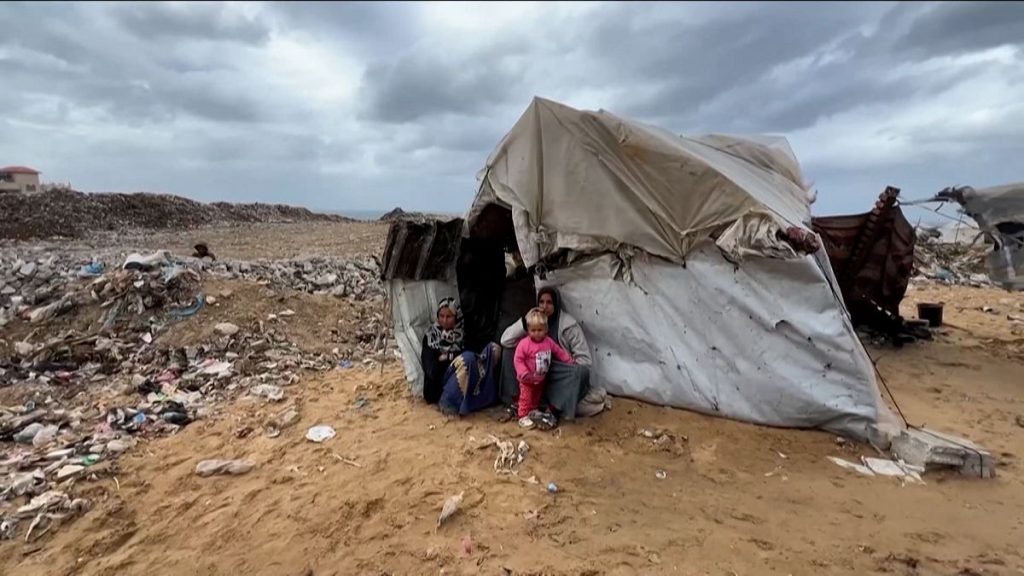The ongoing conflict in Gaza has wrought devastation upon countless Palestinian families, forcing them to abandon their homes and seek refuge in makeshift settlements. West of Nuseirat, a particularly grim reality unfolds as displaced families find themselves living in squalid conditions near a landfill. Torn tents offer minimal protection against the elements, leaving them vulnerable to the harsh realities of rain, biting cold, and pervasive dampness. Resources are scarce, and these families struggle to meet their basic needs, battling not only the physical hardships but also the psychological trauma of displacement and uncertainty. The proximity to the landfill further compounds their woes, exposing them to health risks from the accumulating waste and the accompanying pollution. The stench of decaying garbage permeates the air, while disease-carrying pests and vermin thrive in the unsanitary environment. This precarious existence strips away their dignity and leaves them feeling forgotten and abandoned.
The struggle for survival is a daily ordeal for these displaced families. They lack adequate shelter, with their tattered tents offering little respite from the elements. Rainwater seeps through the torn fabric, soaking their meager belongings and creating a damp, unhealthy living space. During winter months, the cold becomes a relentless adversary, chilling them to the bone as they huddle together for warmth. The absence of proper heating systems forces them to resort to desperate measures, burning plastic and other materials to generate some semblance of heat, inadvertently exposing themselves to toxic fumes and further compromising their health. Clean water is a luxury they cannot afford, and access to sanitation facilities is often limited or non-existent. The lack of basic hygiene further exacerbates the health risks they face, leaving them susceptible to waterborne diseases and other infections.
The landfill itself poses a constant threat to the health and well-being of these families. The mountains of waste generate a noxious odor that permeates their living space, making breathing a challenge and contributing to respiratory illnesses. The decomposing garbage attracts swarms of flies, mosquitoes, and other disease-carrying insects, increasing the risk of infectious diseases, particularly among children and the elderly. The unsanitary environment also provides a breeding ground for rodents and other vermin, further contributing to the spread of disease and contamination. The lack of proper waste management and the open burning of garbage within the landfill release harmful pollutants into the air, further jeopardizing the health of these vulnerable families.
The impact on children is particularly devastating. Deprived of a stable home and a nurturing environment, they witness firsthand the harsh realities of displacement and poverty. Their education is disrupted, robbing them of the opportunity to learn and build a better future. Malnutrition is rampant, weakening their bodies and making them more susceptible to illness. The psychological trauma of displacement, coupled with the constant stress and uncertainty, takes a toll on their mental health. They witness the struggles of their parents and bear the weight of their families’ hardship, their childhood innocence eroded by the harsh realities of their existence.
The international community must not remain silent in the face of this humanitarian crisis. Immediate action is needed to provide these displaced families with the basic necessities they need to survive. Emergency shelter, food, clean water, sanitation facilities, and medical care must be provided without delay. Long-term solutions must also be sought to address the root causes of displacement and to ensure that these families can return to their homes in safety and dignity. Investment in infrastructure, education, and healthcare is crucial to rebuilding their lives and providing them with hope for a better future. The international community has a moral obligation to assist these vulnerable families and to work towards a just and lasting solution to the conflict that has caused their displacement.
The plight of these Palestinian families living near the Nuseirat landfill is a stark reminder of the human cost of conflict. Their resilience in the face of such adversity is commendable, but their survival should not depend on humanitarian aid alone. The international community must act decisively to end the cycle of violence and displacement and to create a future where all Palestinians can live in peace, security, and dignity. Their stories must not be forgotten, and their suffering must compel us to work towards a just and lasting peace in the region, ensuring that no family is forced to endure such inhumane conditions ever again. Their lives, and the lives of future generations, depend on it.














